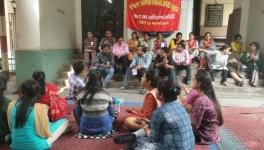Sri Lankan Tea Estate Workers Agitate for Better Pay
(Photo: Maatram.org)
On September 25, hundreds of tea workers in Nuwara Eliya district of Sri Lanka went for a strike to raise their complaints against the regional plantation companies. Tea plantation workers have been carrying out repeated demonstrations in Sri Lanka’s central highlands demanding better pay and work conditions.
The workers demanded an increase in their daily wages to a minimum of LKR 1,000 (USD 5.42). They also complained about plantation owners imposing productivity demands and wage cuts. Plantation workers receive meager wages and are forced to live in crowded shacks without sanitation, running water, medical facilities and schools.
Even though Sri Lanka is the world’s second largest tea exporter and fourth largest producer, tea plantation workers in the country continue to face exploitation and discrimination. This is when the tea industry is among Sri Lanka’s main source of foreign exchange earnings. Various studies have found that tea estate workers are the most impoverished community in the country.
Sri Lanka’s tea industry saw a sharp decline since 2014, which has been exacerbated by the COVID-19 pandemic. Tea production this year is already down by nearly a quarter. The workers have borne the maximum impact of the crisis.
Plantation minister Ramesh Pathirana announced on September 29 that the Mahindra Rajapaksa-led government is planning to gradually transform the declining tea sector “to a sophisticated industrial enterprise” by venturing into the production of a wide range of value-added products.
Plantation workers in Sri Lanka have been protesting for over a year to raise their demands. On October 24, 2018, thousands of tea garden workers along with their relatives staged a massive protest in the national capital Colombo’s Galle Face Green area. Workers demanded that the government increase the daily wage of pickers across the Central and Uva hills. They also called for a revision of the collective agreement signed between the Employers Federation and tea workers’ unions in 2016.
On January 28, 2019, almost 1,000 estate workers gathered in the largest town in the Central Hills district, Hatton, under the banner of ‘One Thousand Movement’, to denounce the union leaders’ new collective agreement.
Tea workers went for another round of strikes in February and December 2019. They also protested against the witch-hunt of activists involved in raising awareness about the plight of the around one million tea estate workers in the country, most of whom are women and belong to the Tamil ethnic minority.
Each year, tea workers process around 675 millions pounds of Ceylon tea to sustain the Sri Lankan tea industry. However, they are forced to work on the plantations for extremely low wages as a large percentage of the land belonging to Tamils continues to be occupied by the Sri Lankan military even after the end of the 27-year long civil war in 2009.
Courtesy: Peoples Dispatch
Get the latest reports & analysis with people's perspective on Protests, movements & deep analytical videos, discussions of the current affairs in your Telegram app. Subscribe to NewsClick's Telegram channel & get Real-Time updates on stories, as they get published on our website.
























